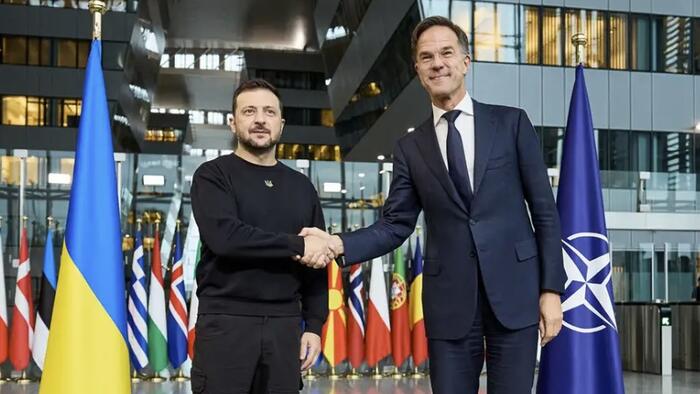Ukrainian President Volodymyr Zelensky has recently made controversial remarks regarding Ukraine’s defense strategy, suggesting that the country must either pursue NATO membership or consider acquiring nuclear weapons. These comments were made during a presentation of his “victory plan” before the EU’s European Council in Brussels, following a tepid response to his proposals from US officials in Washington. Zelensky recounted a private discussion with Republican presidential candidate Donald Trump, where he expressed Ukraine’s precarious security situation and the need for “some kind of alliance” or, alternatively, nuclear arms as a means of defense. He highlighted the harsh reality that, currently, no sufficient alternative alliances exist apart from NATO, which he believes would be crucial for Ukraine’s defense against aggression.
During his address, Zelensky asserted that, in practice, Ukraine operates as a part of NATO, given that member countries are not engaged in war and their civilians remain unharmed. He emphasized his preference for aligning with NATO over pursuing nuclear capabilities, portraying this alliance as a more effective and secure form of protection. He reinforced this argument by referring to the historical Budapest Memorandum of 1994, where Ukraine relinquished its Soviet-era nuclear arsenal in exchange for security assurances from Russia, the United States, and the United Kingdom. He highlighted that, contrary to other nations, only Ukraine has suffered as a result of giving up its nuclear weapons, noting the current ongoing conflict that Ukraine is facing.
After his provocative statements, Zelensky sought to clarify his position during a press conference with NATO Secretary-General Mark Rutte. He downplayed the notion that Ukraine is actively preparing to develop nuclear weapons, stating that his comments were meant to signal the necessity for NATO membership as the only viable alternative to ensure national security. This clarification came amid Russian media speculation about Ukraine’s intentions, particularly with former President Dmitry Medvedev alleging that Ukraine is capable of developing a “dirty bomb.” Medvedev dismissed Zelensky’s nuclear comments as exaggerated but expressed concern over the possibility of Ukraine pursuing less conventional forms of nuclear threats, indicating a level of ongoing tension between the two nations.
Zelensky’s remarks come at a time when Ukrainians are bracing for a “dangerous winter,” with Russian advances in the eastern regions of Ukraine posing additional challenges. The Ukrainian leader has highlighted the urgency for increased financial and military aid from the EU to strengthen Ukraine’s defenses. His assertions regarding the preparation for winter reflect a deeper strategic need for the country to enhance its military capabilities as the conflict continues to evolve. Zelensky’s call for more immediate support underscores the dependency of Ukraine on Western assistance in the face of looming threats.
Furthermore, amid concerns about dwindling military supplies from the US and other Western allies, Zelensky’s nuclear remarks could be a double-edged sword. His overtures towards nuclear armament could alienate some allies who are wary of such escalatory rhetoric, potentially jeopardizing ongoing support. In the context of international relations, Ukraine’s delicate position is marked by the need to balance its defense aspirations with the sensitivities of its Western allies.
Ultimately, Zelensky’s recent statements reflect the broader stakes involved in the ongoing conflict with Russia and the critical nature of alliances in ensuring national security. His appeal for NATO membership reiterates Ukraine’s aspirations for integration into the Western defense framework, while simultaneously navigating pressures from its adversaries. As the situation progresses, the international community will likely closely monitor both Ukraine’s defense strategies and the responses from NATO and EU nations regarding their support in the face of an uncertain geopolitical landscape.

